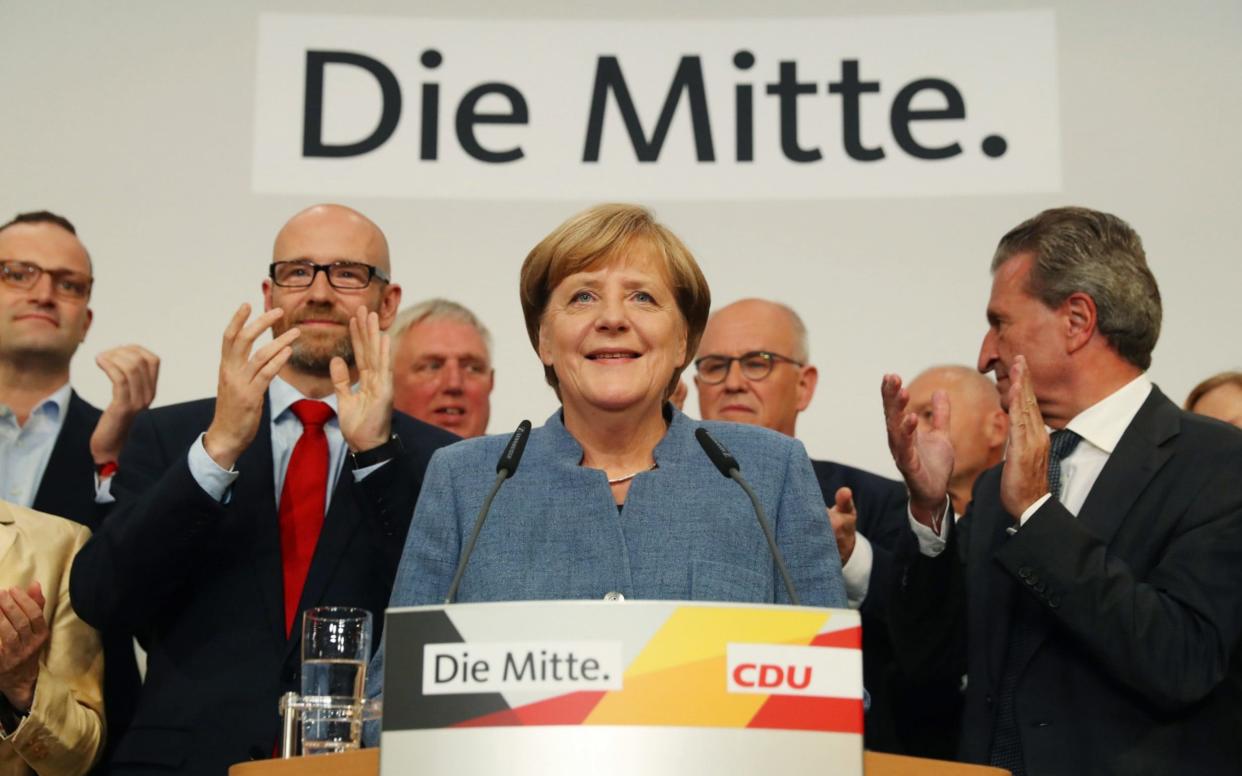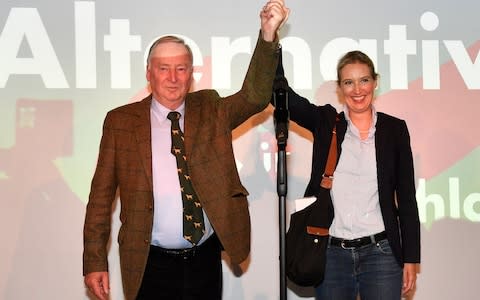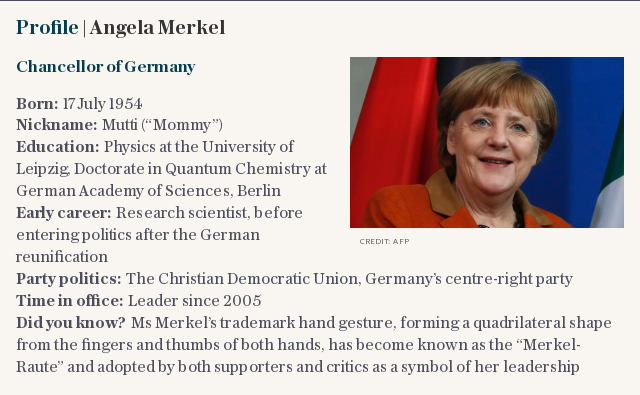Far-right returns to German parliament for first time in 60 years as Angela Merkel wins 4th term

The far-Right returned to the German parliament for the first time in almost 60 years on Sunday night as Angela Merkel won a record-equalling fourth term in power.
The success of the far-Right Alternative for Germany (AfD), which became the third largest party, tempered a remarkable political comeback by Mrs Merkel after the controversy over her handling of the migrant crisis.
Her Christian Democratic Union (CDU) remained the largest party in parliament, and the only party capable of forming a government, although analysts said it could take until Christmas to forge a coalition.
“Of course we hoped for a better result,” Mrs Merkel told supporters in Berlin. “But we have a mandate to form a government. And no government can be formed against us.”
But she acknowledged that dramatic gains for the AfD were the “biggest challenge” facing her government, and vowed to win voters back from the party which campaigned on a nationalist anti-immigrant platform.
“This is a great night. We did it. We are in parliament,” Alexander Gauland, the AfD’s chancellor candidate said. “We will change this country,” he vowed.

“We will hunt Merkel, and reclaim our country and our people.”
But Germany’s system of coalition government will limit the impact of the AfD as mainstream parties unite against it. Mrs Merkel’s former coalition partner, the Social Democratic Party (SPD) suffered the worst electoral defeat in its history and immediately announced it would go into opposition.
Initial exit polls gave the CDU 32.5 per cent of the vote together with its Bavarian sister party, the Christian Social Union (CSU) — down from 41.5 per cent four years ago.

The SPD were second with 20 per cent, followed by the AfD with 13.5 per cent — expected to translate to around 88 seats in parliament.
“We lost the election,” Martin Schulz, the SPD leader who was talked of as Germany’s next chancellor as recently as six months ago, told supporters.
But he said he wanted to stay on as party leader and vowed to take the fight to the AfD. “We are the bulwark of democracy,” he said. AfD hopes of becoming the official opposition party appeared to be dashed when the SPD announced it would not seek a renewal of the current “Grand Coalition” with Mrs Merkel.

“This is a rejection of the Grand Coalition,” Thomas Oppermann, the party’s parliamentary leader said.
The rise of the AfD and the fall in the CDU’s share of the vote were widely seen as a backlash over Mrs Merkel’s controversial 2015 decision to open Germany’s borders to asylum-seekers.
But less than a year after many had written Mrs Merkel’s chances off and her political obituaries were being written, a result which allows her to remain chancellor will also be seen as a comeback.

All eyes will now turn to coalition talks, and Mrs Merkel’s attempts to form a new government. The SPD’s decision to return to opposition has limited her options, with a three-way coalition with the pro-business Free Democratic Party (FDP) and the Greens the only obvious option.
The FDP, which returned to parliament with 10.5 per cent after losing all their seats four years ago, have long been seen as Mrs Merkel’s preferred coalition partner.
The Greens, who won 9 per cent, are also seen as a viable partner after moving to a more pragmatic, centrist course in recent years — but they are not natural bedfellows for the FDP.
The drop in the CDU’s vote share means the two smaller parties will be able to demand a heavy price for their support.
“It was a bad night for Martin Schulz and the Socialists, but also for Mrs Merkel and the Christian Democrats. She still heads the largest party, but she enters these coalition negotiations with a weakened hand,” Christian Odendahl, of the Centre for European Reform think-tank in Berlin said.
“It is the FDP who will be in the strongest position and will now demand the finance ministry, along with the Greens who showed they can win with centrist candidates."
"Forming a three-party government is going to be very difficult,” said Dan Hough, professor of politics at the University of Sussex, who is in Germany to monitor the elections.
“The Greens and the FDP will feel emboldened by the result and given their traditional animosity it's in no way certain that the three parties will be able to strike a coalition agreement.
“The SPD will be traumatised. It's worse even than the doomsayers were predicting. What does all that mean? A betting man certainly would not discount another election before too long.”
Coalition negotiations are likely to be protracted. Talks typically continue for several weeks or months as parties hold out for the best deal, and analysts said a new government may not be formed before Christmas.

 Yahoo News
Yahoo News 
